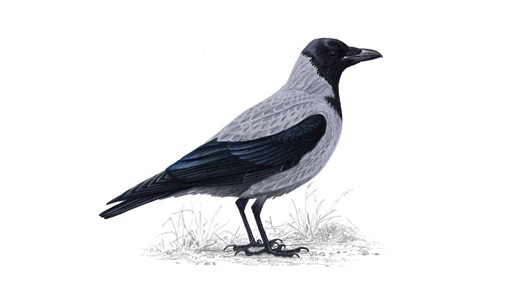9 Million Litres Of Water
 The Traveller's Joy (a rescue plant from the pavement cracks outside our front door, two years ago) that tangles all over the holly and the Bonsai Pine, has flowered for the first time, and is already fading. The scaffolding has finally gone . . . just when I was getting used to having a climbing gym outside my high window, and a (fragmentary) sea view from the top of it. We are solar-paneled, we are double-glazed, the garden is restored to its usual level of untidiness, thank god. In theory I love the summer, but this love is based on the romance of childhood, the end of the educational year, when you down-tools, walk away and abandon your desk as if forever, which I never lost, because my mother was a teacher (until Peter retired). Not so keen on the programme of works idea.
The Traveller's Joy (a rescue plant from the pavement cracks outside our front door, two years ago) that tangles all over the holly and the Bonsai Pine, has flowered for the first time, and is already fading. The scaffolding has finally gone . . . just when I was getting used to having a climbing gym outside my high window, and a (fragmentary) sea view from the top of it. We are solar-paneled, we are double-glazed, the garden is restored to its usual level of untidiness, thank god. In theory I love the summer, but this love is based on the romance of childhood, the end of the educational year, when you down-tools, walk away and abandon your desk as if forever, which I never lost, because my mother was a teacher (until Peter retired). Not so keen on the programme of works idea.The Consultations
To business. There are two UKGov "Consultations" you need to respond to, before 25 October, if you are at all interested in stopping the Tory Party driven, corrupt, fracking industry's assault on democracy; and poisonous industrialization of the countryside. Not to mention the dire reality of climate change. (No point in mentioning that, because Tories just think "I'm rich, I hate foreigners and and I hate my children, so why should i care?)
One consultation asks you to agree that the construction, drilling and operation of a
https://www.gov.uk/government/consultations/permitted-development-for-shale-gas-exploration
The other asks you to agree that the construction, drilling and operation of a fracking well, (or any number of fracking wells) should be treated as a Nationally Significant Infrastructure Project, (like a new railway or motorway network; or a nuclear power station); so that local government and local communities will have no say in the decision.
https://www.gov.uk/government/consultations/inclusion-of-shale-gas-production-projects-in-the-nationally-significant-infrastructure-project-nsip-regime
You can see why these two very different and on the face of it contradictory approaches have equal appeal to UKgov.
Unfortunately, since the wording of the questions is very confusing, the gov doesn't offer any hand-holding, but Frack Free United has useful walkthroughs here:
https://www.frackfreeunited.co.uk/permitted-development-and-nsip/permitted-development-consultation-guidelines/
 Meanwhile, at Balcombe, at Horse Hill, and at Brockham, oil production in the Weald Basin slips by, under the radar. Still industrialising the countryside, still corrupting our local democracy, still blighting clean energy development, but it's not fracking, just a few unauthorised donkeys nodding in the woods; it's not new bad news and though you just keep on saying no, there has to be triage.
Meanwhile, at Balcombe, at Horse Hill, and at Brockham, oil production in the Weald Basin slips by, under the radar. Still industrialising the countryside, still corrupting our local democracy, still blighting clean energy development, but it's not fracking, just a few unauthorised donkeys nodding in the woods; it's not new bad news and though you just keep on saying no, there has to be triage. 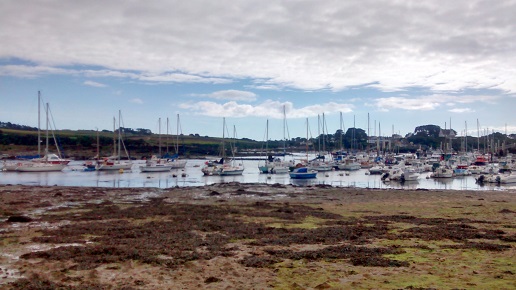 Only 13 pretty little newt infants raised in captivity this year, but more fun, owing to the fact that our wildlife pond had become such a murky puddle, in the weeks of semi-drought, we decided to keep them in a tank until they were almost grown (they leave the water at the end of August or so), and discovered the delights of feeding them. They certainly knew what to do with a cloud of brine shrimp! Only two nights sleeping out in Sussex, and only 10 in Brittany, but we got to Ouessant (Ushant) on the last day trip of the year, which we've never managed before, and the sea voyages there and back; very fine too. Starry nights which I'd been missing badly . . . except for Mars, always managing to be visible even in the thick rainless cloud of this summer in England, baleful red-orange dot, like the Eye of Sauron peering above the horizon at the bottom of our garden.
Only 13 pretty little newt infants raised in captivity this year, but more fun, owing to the fact that our wildlife pond had become such a murky puddle, in the weeks of semi-drought, we decided to keep them in a tank until they were almost grown (they leave the water at the end of August or so), and discovered the delights of feeding them. They certainly knew what to do with a cloud of brine shrimp! Only two nights sleeping out in Sussex, and only 10 in Brittany, but we got to Ouessant (Ushant) on the last day trip of the year, which we've never managed before, and the sea voyages there and back; very fine too. Starry nights which I'd been missing badly . . . except for Mars, always managing to be visible even in the thick rainless cloud of this summer in England, baleful red-orange dot, like the Eye of Sauron peering above the horizon at the bottom of our garden. Mixed Media
The Labour Conference was good value; the Tories promising, but dull so far, after that early amusing data breach. I'm reading the Bible again (which I do, periodically, always the King James, because it's full of quotations), and discovering again how the famous, marvellous, life-changing OT (as we call it) is largely boring bits, lists, unaccountable repetition of huge chunks of sartorial instruction, nit-picking and misplaced attention. Look at Joseph in Egypt, so famous for those clever prophetic dreams. Ha! What about that Pharoah, (whoever he was)? A CEO, PM, Great Dictator, king, chief, president, whatever . . . who actually listened to the commonsense advice, and actually acted on it. Unheard of. This does not happen. That's the real wonder tale. But maybe it gets better. Of course I haven't got to Psalms yet. Did you know that Sarah (Abraham's chief wife, remember) seems to have also been his sister? Did you know women like Rachel had property of their own?
I've also decided to read Virginia Woolf again (=the Joanna Russ connection) & thanks to the modern miracle of epub, I can embark on The Lot, from The Voyage Out to Early Journals (pub1990). The Voyage Out conjures up my own youth (because that's when I last read it), in its lovely, wavering, acutely observed Impressionist style, but then a pall descends on everything, because I know someone's going to die, and there's going to be nothing else to say. Night and Day is where I am now, and it goes on a bit. On and on and on. What strikes me most is the vital, unthinking, ritual shibboleth of meal times; especially tea. The religion that outlasted religion. I suppose it comes of having servants. The servants dictate the household routine, and it's built around meals, so that's the law everybody has to obey. Ah, well. Ever onward.
Farewell and adieu to you ladies of Spain
For we're under orders to set sail for old England
And we may never see you fair Spanish Ladies again
We'll rant and we'll roar like true British sailors
We'll rant and we'll roar all across the salt seas
Until we strike soundings in the Channel of Old England
From Ushant to Scilly is thirty-five leagues
9 million litres? That's how much water is used for one frack. The contaminated waste water can then, in the US, be used to irrigate crops. Not over here: not yet. But it's not a good idea to drink it!

 Not much of a march, really. St James's Square, to Parliament Square. How long's that going to take? Twenty minutes? Half an hour, tops. We assemble under the auspices of the
Not much of a march, really. St James's Square, to Parliament Square. How long's that going to take? Twenty minutes? Half an hour, tops. We assemble under the auspices of the 
 Rude words are bawled out, to anciently popular tunes. Placard messages favour gentleness, and good old British politeness . . . It's a meme, obviously, this rudeness and the good manners. Dogs trot to heel. Time, traditionally, for me to wonder why I'm here. Am I convinced @theresa_may is secretly a good guy, and I want her to know she has support for her cunning plan to sneak out of this daft impasse at the last possible moment, when her tormentors Johnson-Gove-Rees-Mogg et al are looking the other way? (No). Do I believe that the "Protest March", "raising awareness" tactic works? (It's been known to happen, but
Rude words are bawled out, to anciently popular tunes. Placard messages favour gentleness, and good old British politeness . . . It's a meme, obviously, this rudeness and the good manners. Dogs trot to heel. Time, traditionally, for me to wonder why I'm here. Am I convinced @theresa_may is secretly a good guy, and I want her to know she has support for her cunning plan to sneak out of this daft impasse at the last possible moment, when her tormentors Johnson-Gove-Rees-Mogg et al are looking the other way? (No). Do I believe that the "Protest March", "raising awareness" tactic works? (It's been known to happen, but 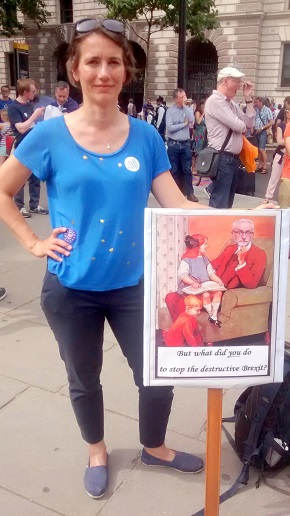 convince us of things we already know (or we wouldn't be here).
convince us of things we already know (or we wouldn't be here). 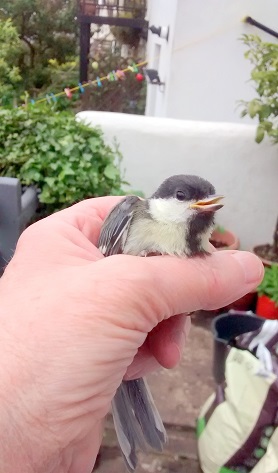 Guess, just guess, how I happen to be holding the great tit's child in my hand? You're absolutely right. Dear Tilly came bounding in and leapt onto the piano keys, jaws full of desperate flutter: look what I've brought you! So then I was bad:rescued the little bird from her soft mouth (she'd make a good gun dog), got her by the scruff, shouted at her and dumped her outdoors. The juvenile great tit was fine: bright-eyed, cheerful and brave . . . as you'd expect from the family's general demeanour, but cat was outdoors, bird indoors, exactly the opposite of what I needed. A useful moral lesson, more haste less speed, if only I could profit from my mistakes (never happens). I had to leave the infant in a box in my office & and cajole Tilly, while she sat on Claire and Steve's compost bin two fences away, very hurt and ostentatiously not looking my way. Anyway, it ended well. The infant flew away, soon as I was sure it was undamaged, and Tilly has forgiven me.
Guess, just guess, how I happen to be holding the great tit's child in my hand? You're absolutely right. Dear Tilly came bounding in and leapt onto the piano keys, jaws full of desperate flutter: look what I've brought you! So then I was bad:rescued the little bird from her soft mouth (she'd make a good gun dog), got her by the scruff, shouted at her and dumped her outdoors. The juvenile great tit was fine: bright-eyed, cheerful and brave . . . as you'd expect from the family's general demeanour, but cat was outdoors, bird indoors, exactly the opposite of what I needed. A useful moral lesson, more haste less speed, if only I could profit from my mistakes (never happens). I had to leave the infant in a box in my office & and cajole Tilly, while she sat on Claire and Steve's compost bin two fences away, very hurt and ostentatiously not looking my way. Anyway, it ended well. The infant flew away, soon as I was sure it was undamaged, and Tilly has forgiven me. 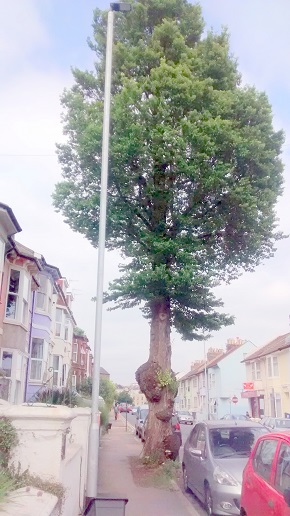 doesn't have the bug, it has fungal rot, and the Council has decided to remove it rather than risk having to pay up if it suddenly falls on someone's car or something. A reasonable decision or a detestable mindset? On this occasion, I could go either way. But the rise of UK local and national government's pogrom of the trees is certainly a detestable phenomenon, and inexplicable to me. Trees embellish the land (that's Chekov). They make our cities beautiful and liveable; they improve the air, they steady the traffic in towns, they improve human well-being, they're an economic asset. Destroying them, however, seems to be a vital element in UKGov's strategic planning:
doesn't have the bug, it has fungal rot, and the Council has decided to remove it rather than risk having to pay up if it suddenly falls on someone's car or something. A reasonable decision or a detestable mindset? On this occasion, I could go either way. But the rise of UK local and national government's pogrom of the trees is certainly a detestable phenomenon, and inexplicable to me. Trees embellish the land (that's Chekov). They make our cities beautiful and liveable; they improve the air, they steady the traffic in towns, they improve human well-being, they're an economic asset. Destroying them, however, seems to be a vital element in UKGov's strategic planning: Eleanor Marx, youngest of Karl Marx's three surviving children (others died in childhood and infancy), a political radical and Bohemian by birth and passion; active in the Paris Commune disaster as a teenager; ran away to Brighton to support herself at eighteen, as (unlike the rest of her family), it upset her to be leeching on the long-suffering Engels the whole time . . . What a grim world for women! So many pregnancies, so few surviving children, so many fine minds and talented individuals, crushed under the wheels of radical politics. Derisory numbers, of course, compared to "crushed under the wheels of privilege and rampant capitalism", but a shocking reminder that the women were always there. As gifted, as dedicated, as resolute, but doomed by biology, custom, and the complacency of the men they supported.
Eleanor Marx, youngest of Karl Marx's three surviving children (others died in childhood and infancy), a political radical and Bohemian by birth and passion; active in the Paris Commune disaster as a teenager; ran away to Brighton to support herself at eighteen, as (unlike the rest of her family), it upset her to be leeching on the long-suffering Engels the whole time . . . What a grim world for women! So many pregnancies, so few surviving children, so many fine minds and talented individuals, crushed under the wheels of radical politics. Derisory numbers, of course, compared to "crushed under the wheels of privilege and rampant capitalism", but a shocking reminder that the women were always there. As gifted, as dedicated, as resolute, but doomed by biology, custom, and the complacency of the men they supported. 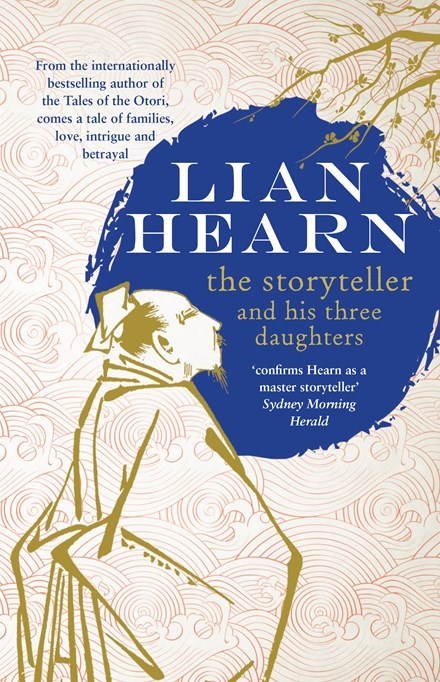 This book is just lovely. Set in 1884, in a Japan just opening up to "the West", but actually far more interested in its Korean adventures. Not as fantastical as the more famous Otori series (although there's a spooky strand), or its Shikanoko historical prequels, but a really delightful reading experience from start to finish.
This book is just lovely. Set in 1884, in a Japan just opening up to "the West", but actually far more interested in its Korean adventures. Not as fantastical as the more famous Otori series (although there's a spooky strand), or its Shikanoko historical prequels, but a really delightful reading experience from start to finish. 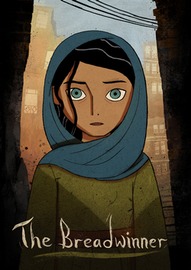 Animation, from the people who brought you
Animation, from the people who brought you  All the politics, sexual and global (Big Man culture/aka toxic masculinity is at the heart of what's wrong with Congo); but the fantasy comes with; this element supplied by the original Leopard-skin Pill-Box Hat Man (I mean
All the politics, sexual and global (Big Man culture/aka toxic masculinity is at the heart of what's wrong with Congo); but the fantasy comes with; this element supplied by the original Leopard-skin Pill-Box Hat Man (I mean  Would you like to go to Iceland? The large chilly island, I mean? With the hole that leads to the centre of the earth. I'd love to go to Iceland, and maybe I will, one fine summer. Meanwhile, an NZ pro-review site spotted the Iceland reference (it's the drained magma chamber you can visit) in my
Would you like to go to Iceland? The large chilly island, I mean? With the hole that leads to the centre of the earth. I'd love to go to Iceland, and maybe I will, one fine summer. Meanwhile, an NZ pro-review site spotted the Iceland reference (it's the drained magma chamber you can visit) in my 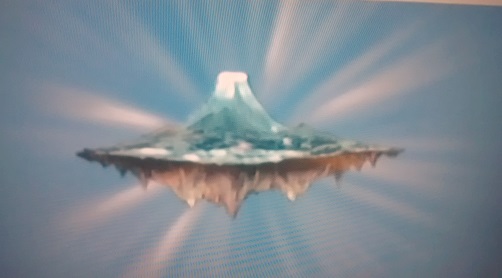 The end of an era: I finally finished
The end of an era: I finally finished 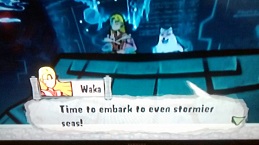
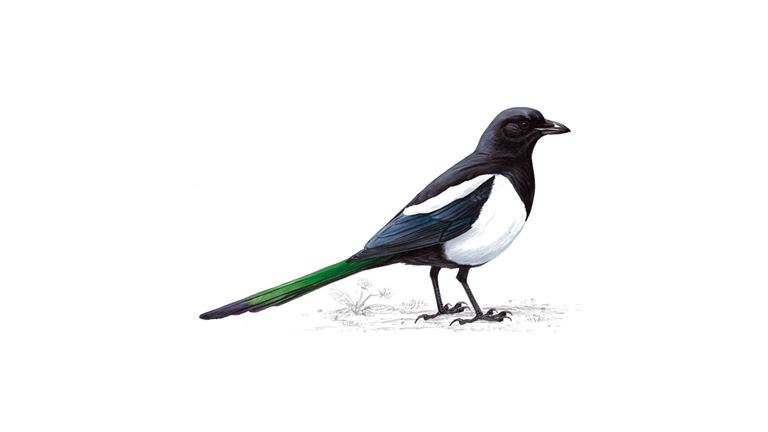
 The lovely quote above is from a Chinese horoscope site, heralding the new year of the Earth Dog that starts on Friday (16th Feb). I'll certainly be watching out for those poetic moods and, between my sighs, finding more or less plausible reasons to be hopeful. We had greenfinches on our bird feeding station for the RSPB count, first time in years. Likewise dunnocks, and the male blackcap, besides plenty of the more regular customers. The frogs are back in the fish pond, and the snowdrops, though few of mine survived the ravages of those evil squirrels, have been unusually wonderful in King Death's Garden . . .
The lovely quote above is from a Chinese horoscope site, heralding the new year of the Earth Dog that starts on Friday (16th Feb). I'll certainly be watching out for those poetic moods and, between my sighs, finding more or less plausible reasons to be hopeful. We had greenfinches on our bird feeding station for the RSPB count, first time in years. Likewise dunnocks, and the male blackcap, besides plenty of the more regular customers. The frogs are back in the fish pond, and the snowdrops, though few of mine survived the ravages of those evil squirrels, have been unusually wonderful in King Death's Garden . . .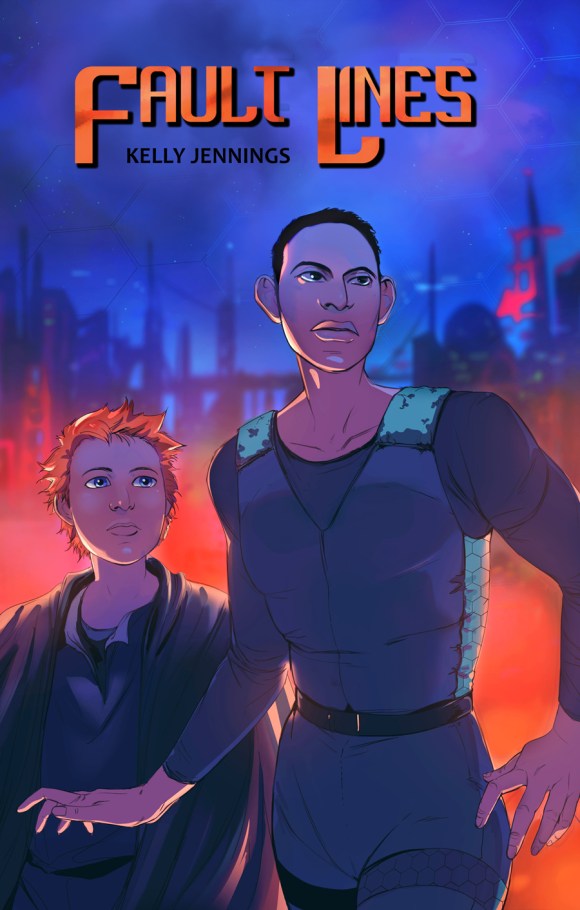
 Nakanokimi is facing the realities of a subordinate marriage to the court's darling, Prince Niou. We're moving into the endgame. I love the final section of this (more than a) thousand year old novel. Murasaki has observed the conventions of court fiction for so long, waving a magic wand of sighs, poetic allusions, exquisite robes, bird-song and dew and perfume, over the marriage-by-rape convention of her enclosed, palace society; always taking the male point of view (which her female audience also preferred, to avoid the humiliating reality. However boldly they played their sexual cards in reality they had no control; no control at all). With Oigimi, suddenly she reverses the tapestry, and its thrilling. Though tough on the two sisters.
Nakanokimi is facing the realities of a subordinate marriage to the court's darling, Prince Niou. We're moving into the endgame. I love the final section of this (more than a) thousand year old novel. Murasaki has observed the conventions of court fiction for so long, waving a magic wand of sighs, poetic allusions, exquisite robes, bird-song and dew and perfume, over the marriage-by-rape convention of her enclosed, palace society; always taking the male point of view (which her female audience also preferred, to avoid the humiliating reality. However boldly they played their sexual cards in reality they had no control; no control at all). With Oigimi, suddenly she reverses the tapestry, and its thrilling. Though tough on the two sisters.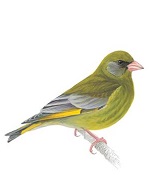 keeping on, and derision to the investors, however small, however mighty. Let's leave it there.
keeping on, and derision to the investors, however small, however mighty. Let's leave it there.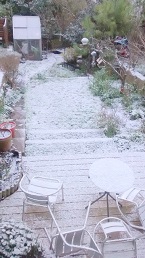 Last week they held the UK (ha!) Eurovision shortlist event in Brighton Dome. A modest EUrovision event "flashmob" was organised, and naturally I went down to join in, a short walk in the crispy night (sadly without snow, the snow had melted by then). We waved that blue flag with the yellow stars, big ones & small ones. We herded about, never getting far from the beery warmth of the Mash Tun, and sang Ode To Joy in English, on the other side of the street from the entrance to the great event. (The German words are better, but it's a good rousing tune, at least; although not the composer's best work). Then I went home. I did not forget to thank the police officers. Never forget to thank the police (if they've been well behaved). And here is a special official search string, for you to cut and paste. The official song, in all its stunning banality:
Last week they held the UK (ha!) Eurovision shortlist event in Brighton Dome. A modest EUrovision event "flashmob" was organised, and naturally I went down to join in, a short walk in the crispy night (sadly without snow, the snow had melted by then). We waved that blue flag with the yellow stars, big ones & small ones. We herded about, never getting far from the beery warmth of the Mash Tun, and sang Ode To Joy in English, on the other side of the street from the entrance to the great event. (The German words are better, but it's a good rousing tune, at least; although not the composer's best work). Then I went home. I did not forget to thank the police officers. Never forget to thank the police (if they've been well behaved). And here is a special official search string, for you to cut and paste. The official song, in all its stunning banality: 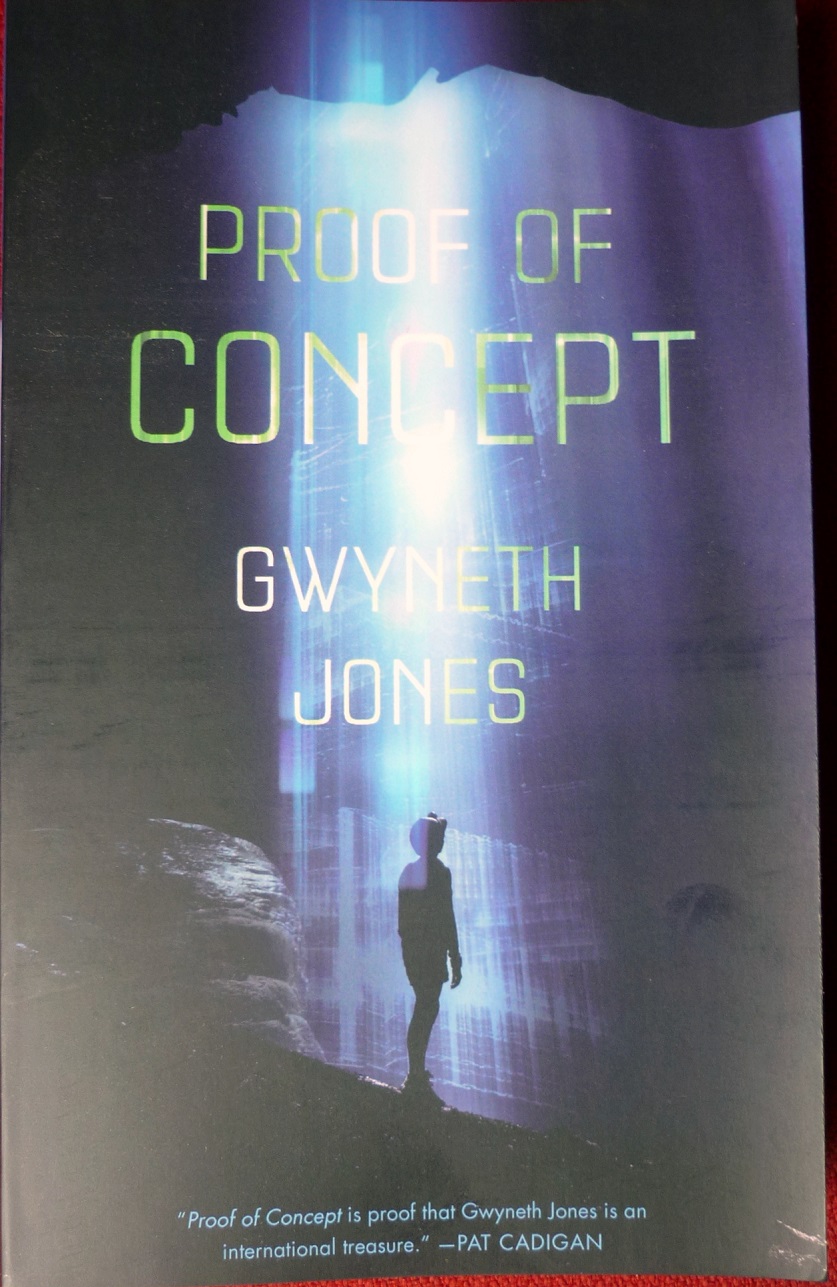
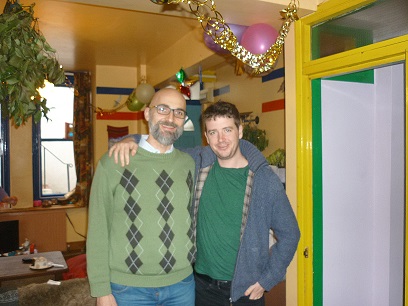 Cultural highlight #1
Cultural highlight #1 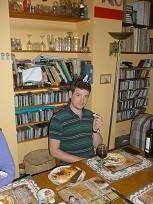 Gabriel's Swiss friend Eric came to stay, fortuitously on Twelfth Night, the feast of the kings, and brought with him from the mainland a kind of flaky, nutty-goo filled tart, a speciality for this occasion, to follow Gwyneth's traditional end of Christmas paella. A small foldable silver cardboard crown came with it, and Gabriel won the prize. So here he is, somewhat disconcerted to find he nearly broke a tooth not on the Baby Jesus, or maybe a Flask of Myrrh, but on a miniature sporting shoe.
Gabriel's Swiss friend Eric came to stay, fortuitously on Twelfth Night, the feast of the kings, and brought with him from the mainland a kind of flaky, nutty-goo filled tart, a speciality for this occasion, to follow Gwyneth's traditional end of Christmas paella. A small foldable silver cardboard crown came with it, and Gabriel won the prize. So here he is, somewhat disconcerted to find he nearly broke a tooth not on the Baby Jesus, or maybe a Flask of Myrrh, but on a miniature sporting shoe. 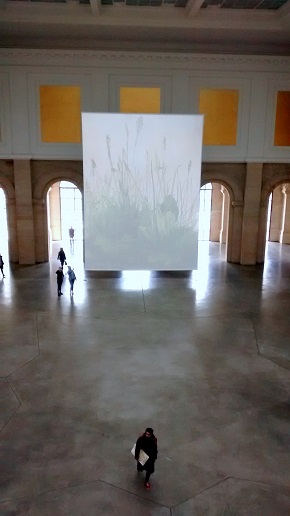
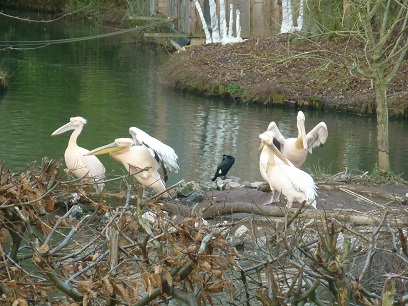 Why did I ever agree to take a trip to Lille in January? Maybe I wasn't paying attention . . . It was all for the sake of French chanteuse Camille, with her floating and flowing veils, her rousing drummers and her men in kilts, featuring on a Jools Holland special. Verdict, three days later:
Why did I ever agree to take a trip to Lille in January? Maybe I wasn't paying attention . . . It was all for the sake of French chanteuse Camille, with her floating and flowing veils, her rousing drummers and her men in kilts, featuring on a Jools Holland special. Verdict, three days later:  Swags of Eighteenth century draperies,garlands, swords and flags mingle with more recent memorials: a monument for the gallant carrier pigeons of WWI; tablets remembering the fusillées, and those hung in their cells, in the Nazi occupation.
Swags of Eighteenth century draperies,garlands, swords and flags mingle with more recent memorials: a monument for the gallant carrier pigeons of WWI; tablets remembering the fusillées, and those hung in their cells, in the Nazi occupation. I'd heard of him, he's hard to avoid if you study C17 European History, however hazily; as I did, long ago. I'd never heard of
I'd heard of him, he's hard to avoid if you study C17 European History, however hazily; as I did, long ago. I'd never heard of 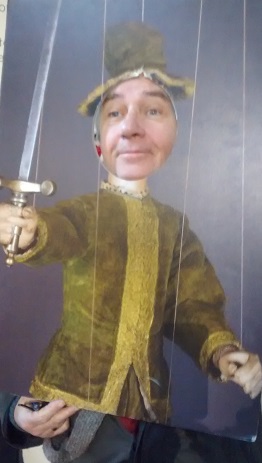
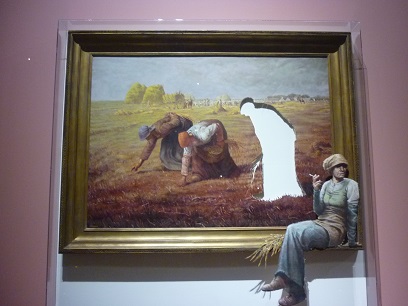
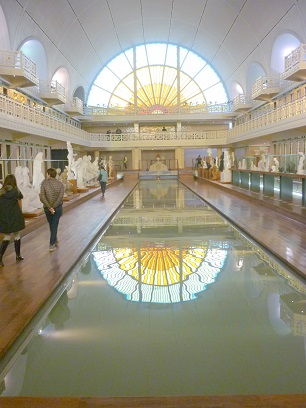
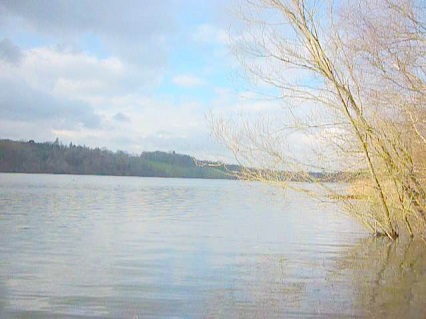 Late with the final ceremony of the Christmas season this year, we took the last 2 slices of cake (very good cake) to Balcombe and
Late with the final ceremony of the Christmas season this year, we took the last 2 slices of cake (very good cake) to Balcombe and 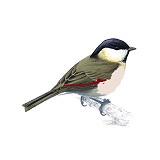
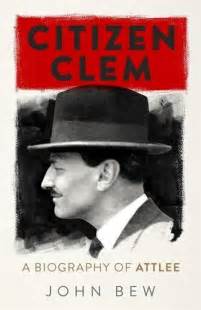
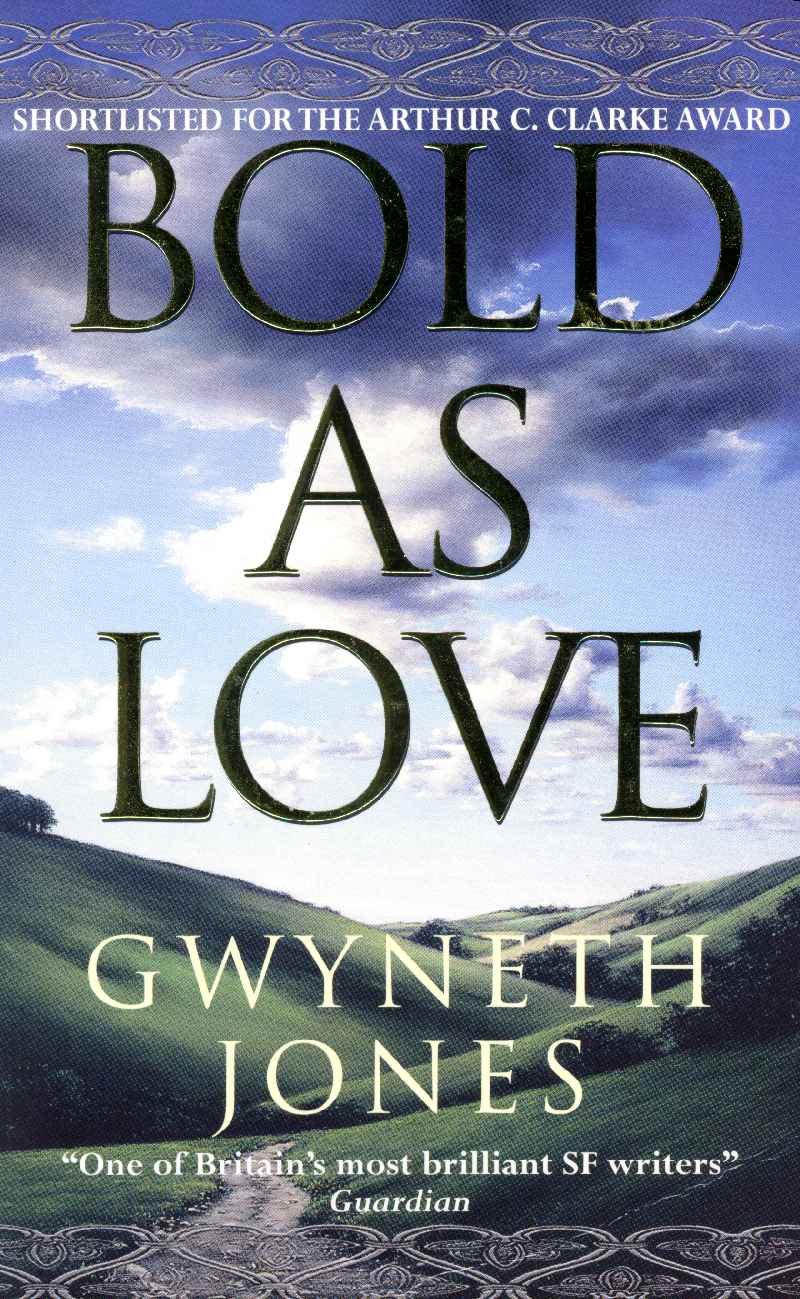
 Back in July 2013, a young Syrian woman, engineering student, came to talk to the Brighton Amnesty Group, about a revolution that began in flowers, petals and coloured fountains, it was young Syrians trying to get the message to Assad, your regime is hateful and we've had enough . She brought a movie for us to watch; I remember We Are The Spring, written in green, Arabic of course, with flowers, on a broken concrete slab. Today, or maybe yesterday by now, Assad retook Raqqa, the so-called capital of the Daesh caliphate. In between, these young men, this citizen journalist collective, got the news out of this starving city; or died trying. Mostly both. Very moving, claustrophobic; overwhelmingly male. Not a woman in sight, except a few shrouded black stick figures outside Paradise Park, hovering beside the dead bodies of resistance fighters, husbands, fathers, sons or brothers their severed heads impaled on the park railings; a few head-scarved little girls, in the crowds of kids scampering after Daesh PR jeeps, squealing for candy and mobiles. You get the picture. It wasn't like this, in Syria, just a few years ago, but it's a man's, man's man's world again now.
Back in July 2013, a young Syrian woman, engineering student, came to talk to the Brighton Amnesty Group, about a revolution that began in flowers, petals and coloured fountains, it was young Syrians trying to get the message to Assad, your regime is hateful and we've had enough . She brought a movie for us to watch; I remember We Are The Spring, written in green, Arabic of course, with flowers, on a broken concrete slab. Today, or maybe yesterday by now, Assad retook Raqqa, the so-called capital of the Daesh caliphate. In between, these young men, this citizen journalist collective, got the news out of this starving city; or died trying. Mostly both. Very moving, claustrophobic; overwhelmingly male. Not a woman in sight, except a few shrouded black stick figures outside Paradise Park, hovering beside the dead bodies of resistance fighters, husbands, fathers, sons or brothers their severed heads impaled on the park railings; a few head-scarved little girls, in the crowds of kids scampering after Daesh PR jeeps, squealing for candy and mobiles. You get the picture. It wasn't like this, in Syria, just a few years ago, but it's a man's, man's man's world again now. 


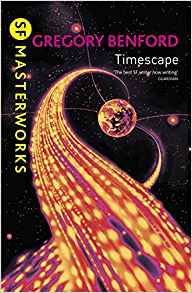

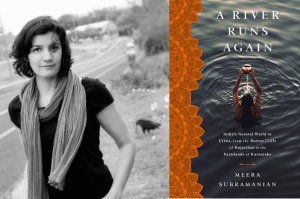
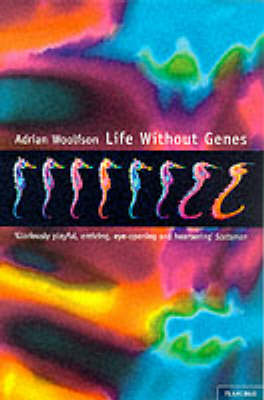
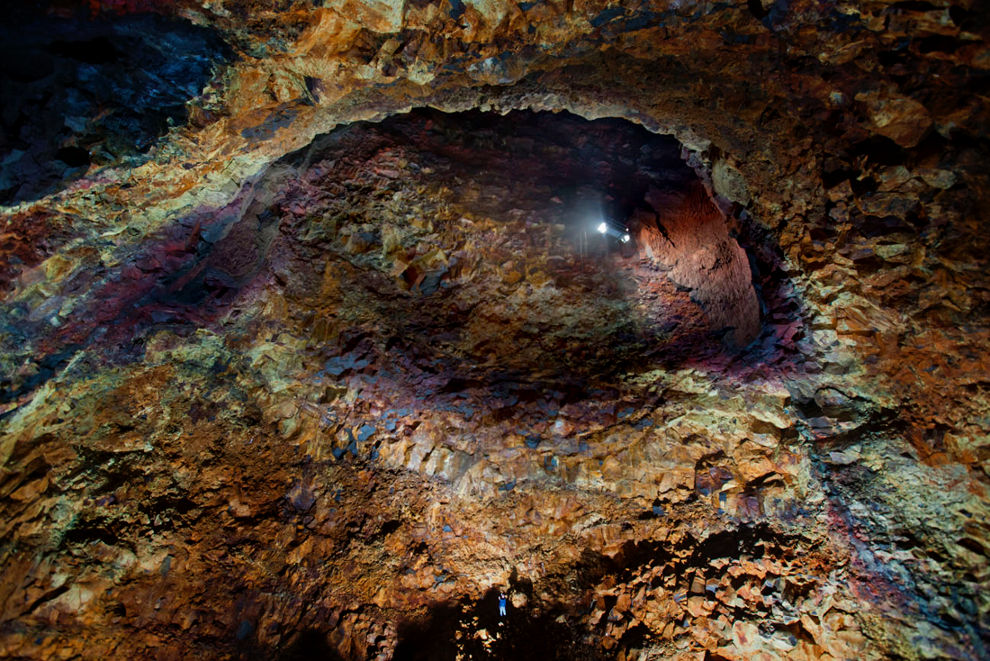
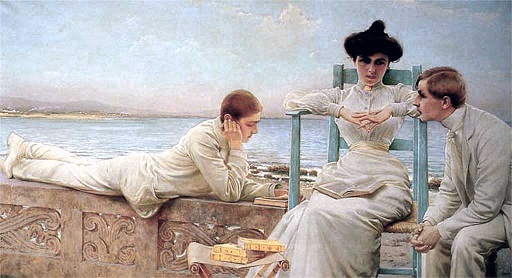

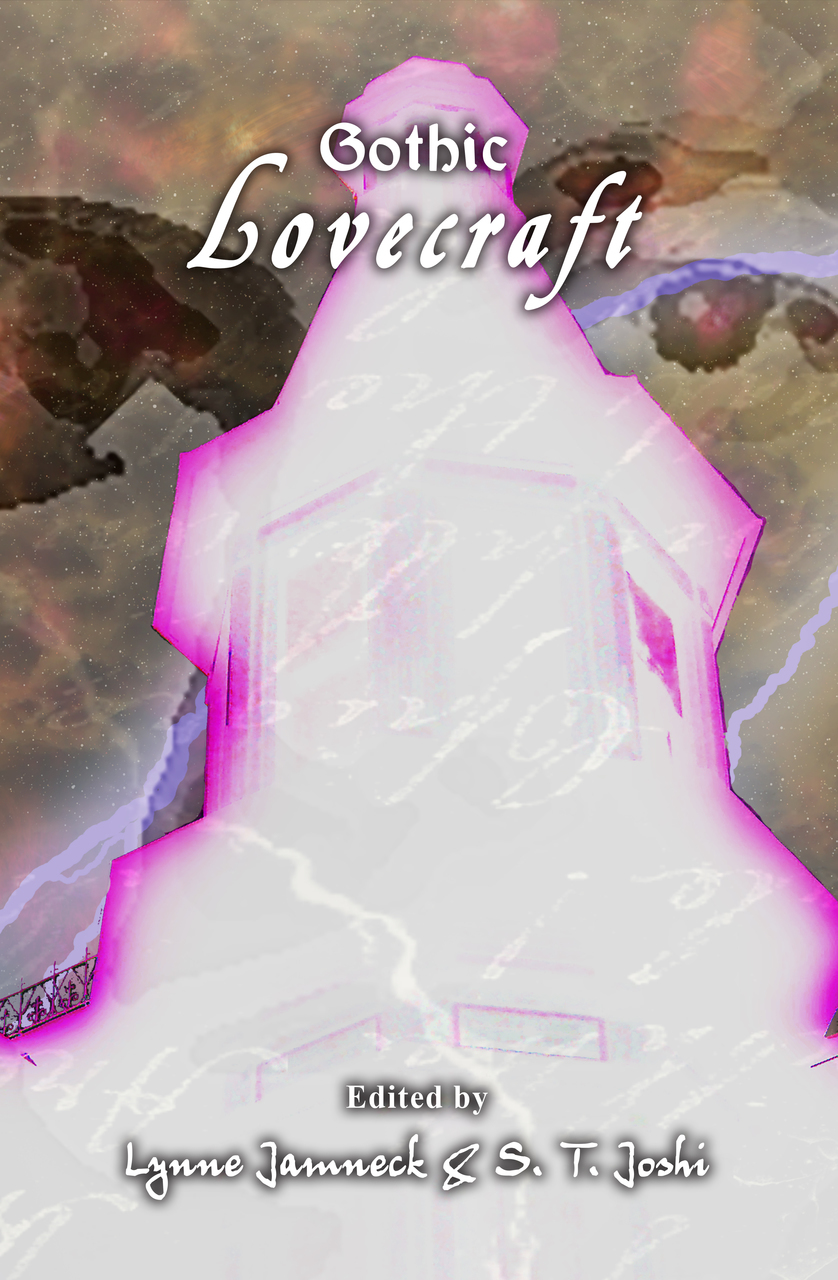
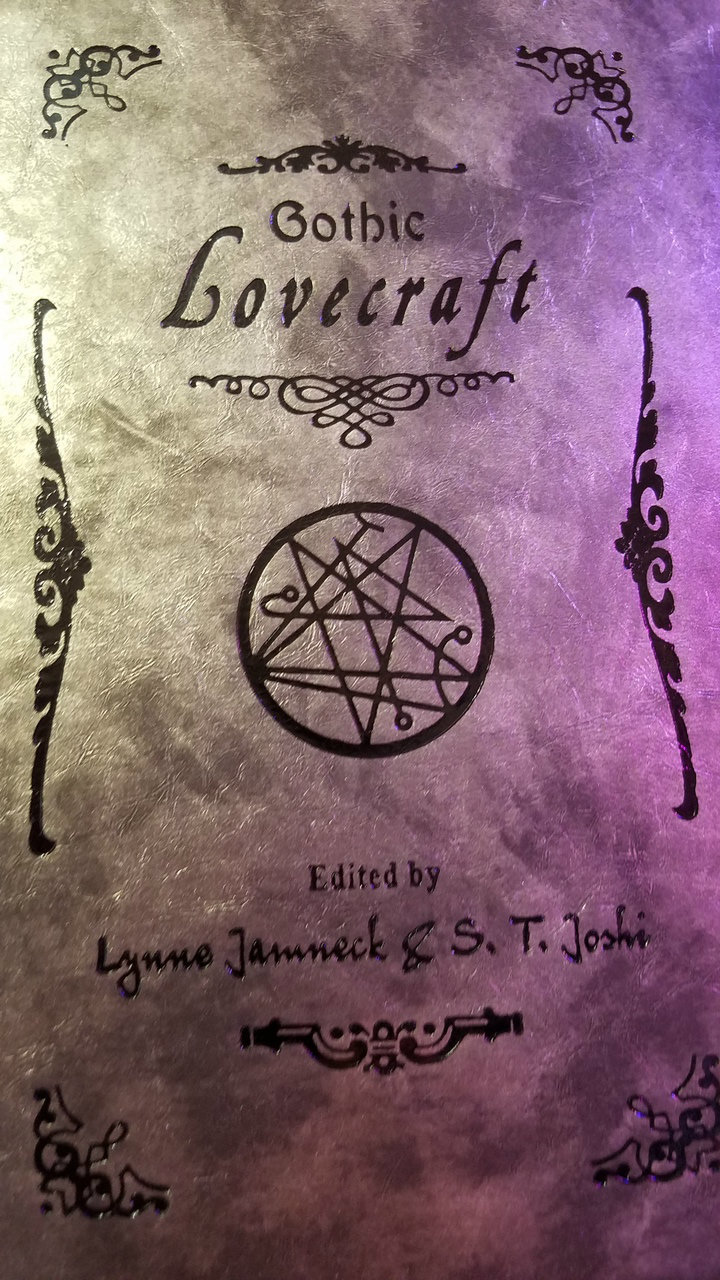



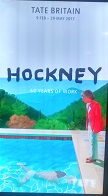



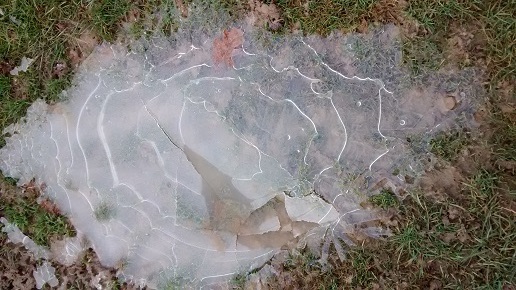
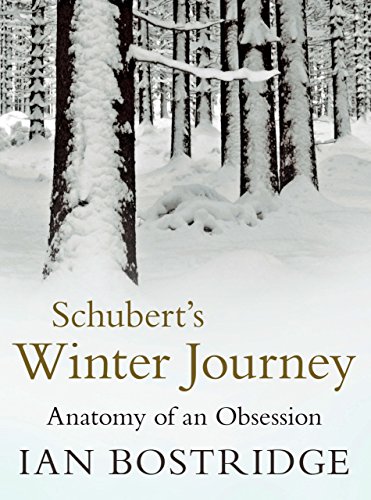 Mainly, I admit, because I've just read Ian Bostridge's
Mainly, I admit, because I've just read Ian Bostridge's 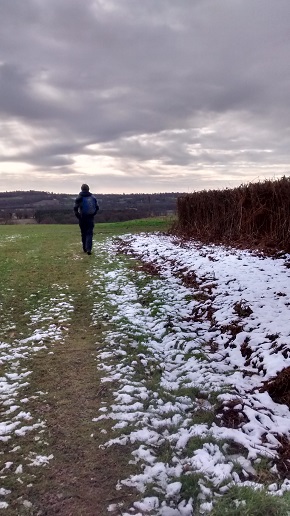
 decided the humble, ignorant folk Ooop North would surely be more docile
decided the humble, ignorant folk Ooop North would surely be more docile 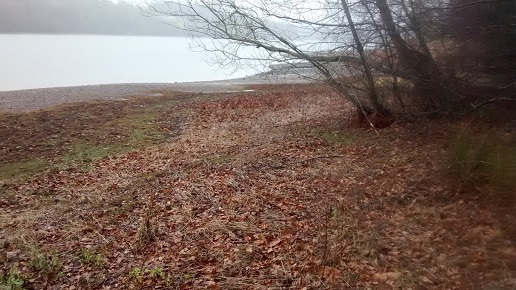
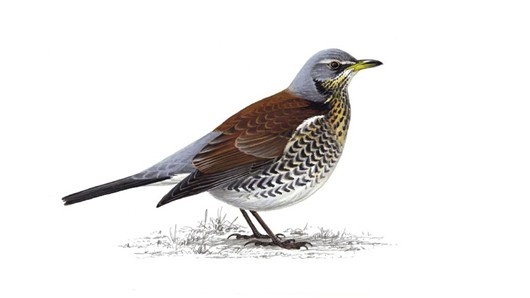
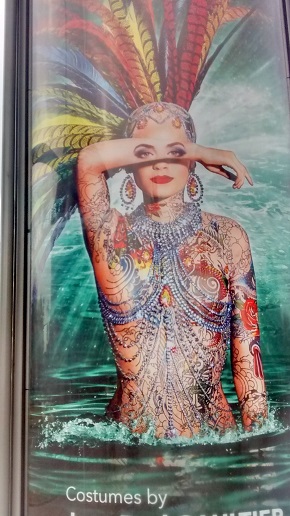 Monday 24th October. It's the last of our autumn half-term city breaks; for there will be no more half-terms. Fantastic apartment, practically next door to the
Monday 24th October. It's the last of our autumn half-term city breaks; for there will be no more half-terms. Fantastic apartment, practically next door to the 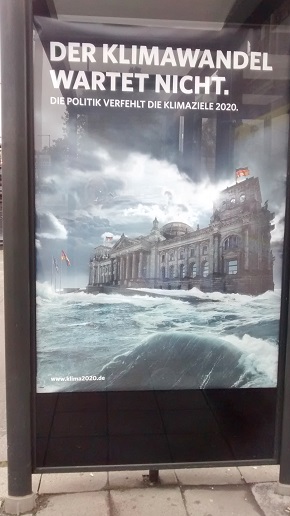 clubbing, or visiting that fabulous rooftop bar Gabriel raves about. Cracking headache, aches and pains, thick head, stiff neck feeling sick, but I'll get by. First time we've had our passport check automated at St Pancras, I suppose the full body-scan won't be far behind. . . but still a nice atmosphere down there at the Intercontinental Bar. I have read The Green Hat (Michael Arlen), mysteriously placed in "The Second Inquisition", as glamorous naughty book, but this has always puzzled me, as the novel is actually really, really miserable, unless you think having multiple septic abortions is glamorous. One of that mini-genre I call "Syphilis trash romance" (better done by Ethel M.Dell in
clubbing, or visiting that fabulous rooftop bar Gabriel raves about. Cracking headache, aches and pains, thick head, stiff neck feeling sick, but I'll get by. First time we've had our passport check automated at St Pancras, I suppose the full body-scan won't be far behind. . . but still a nice atmosphere down there at the Intercontinental Bar. I have read The Green Hat (Michael Arlen), mysteriously placed in "The Second Inquisition", as glamorous naughty book, but this has always puzzled me, as the novel is actually really, really miserable, unless you think having multiple septic abortions is glamorous. One of that mini-genre I call "Syphilis trash romance" (better done by Ethel M.Dell in  hat, made of beaten gold, covered in arcane symbols, and dating the museum believes, from about 1000BC. Bought from an antiques dealer in 1996. It's been deciphered as a record and a demonstration of vital calendar information, converting from the Lunar calendar to the Solar calendar. (& if you don't get what that implies, dear reader, I'm guessing you're not female?). Hm. Maybe I should have smashed the case, or scrawled it with red paint GIVE US BACK OUR ELEVEN DAYS! But I just gaped. One thing I do not expect in an ancient history museum is a proper surprise. Wow. J K Rowling missed a trick!
hat, made of beaten gold, covered in arcane symbols, and dating the museum believes, from about 1000BC. Bought from an antiques dealer in 1996. It's been deciphered as a record and a demonstration of vital calendar information, converting from the Lunar calendar to the Solar calendar. (& if you don't get what that implies, dear reader, I'm guessing you're not female?). Hm. Maybe I should have smashed the case, or scrawled it with red paint GIVE US BACK OUR ELEVEN DAYS! But I just gaped. One thing I do not expect in an ancient history museum is a proper surprise. Wow. J K Rowling missed a trick! 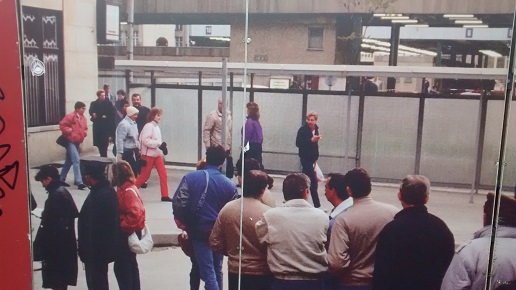

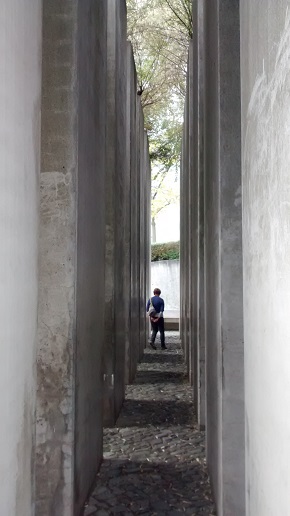 own meaning for this darkness. So of course I thought of the oblivion that is likely (on current figures) to swallow me, years before I die. I'm very, very much more terrified of that than I am of death itself, because death at least is a door out, whatever lies beyond. An escape.
own meaning for this darkness. So of course I thought of the oblivion that is likely (on current figures) to swallow me, years before I die. I'm very, very much more terrified of that than I am of death itself, because death at least is a door out, whatever lies beyond. An escape. 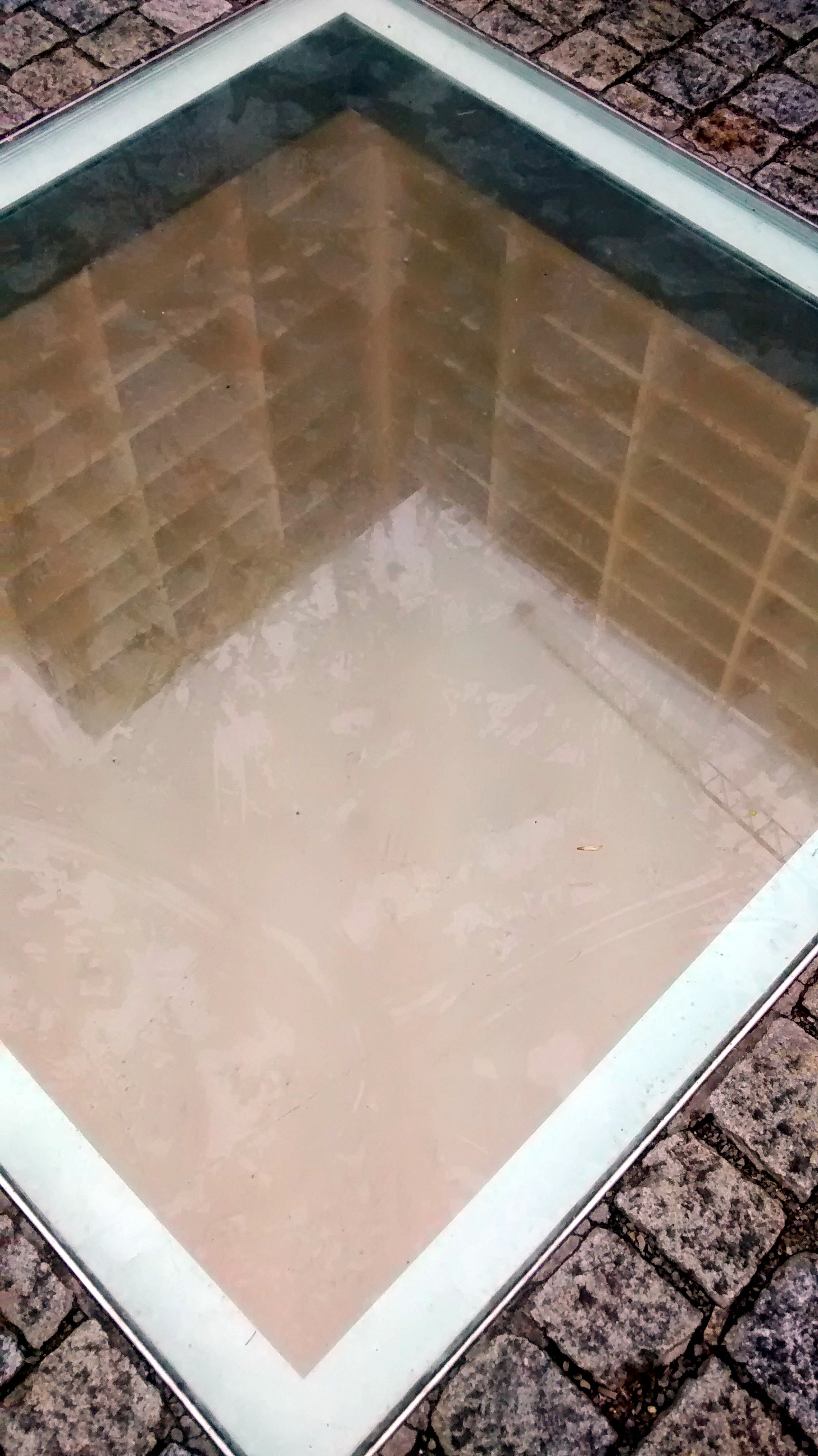 impressed by the
impressed by the 